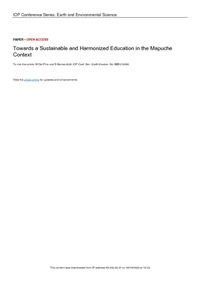Mostrar el registro sencillo de la publicación
Towards a sustainable and harmonized education in the mapuche context
| dc.contributor.author | Del Pino, Miguel | |
| dc.contributor.author | Berres, S. | |
| dc.date.accessioned | 2020-11-09T13:16:35Z | |
| dc.date.available | 2020-11-09T13:16:35Z | |
| dc.date.issued | 2020 | |
| dc.identifier.uri | http://repositorio.ucm.cl/handle/ucm/3168 | |
| dc.description.abstract | The intercultural education in the Mapuche context has been generating many criticisms in the Chilean context. One of the main criticisms is that intercultural education programs have been imposed by the State, but do not respond to the educational needs or requirements of indigenous communities. Moreover, these programs have not been built in collaboration with the indigenous communities themselves. In this sense, a mayor question remains: what is actually meant by "interculturality" by the Mapuche people themselves, as they state that they are already intercultural because they know both their language (mapuzungun) and the official language of Chile (Castilian) and have forcibly accepted the institutionality and western rationality in Chile. In this context, it is worth asking how "interculturality" can contribute to a sustainable development of education in the Mapuche context. Since "sustainable development", as implemented in "interculturality programs", has a western epistemic base, it tends to lead to a homogenization of the knowledge and its further development. Therefore, if we want to think of education for sustainable development in a hypothetical and ideal way, then we should establish a broader or expanded epistemology that covers both language and action of indigenous epistemologies such as "balance" and "harmony" with the land, the rivers, the lakes, the forests, the people, the peoples and the cosmos; we observe that parts of the western epistemologies are aligning to that "balance" with the aim to valorise and recognize the importance of life in "community". Thus, from the above, there emerges the need to rescue territorial and sociocultural components, which show epistemic and epistemological categories, from both western and indigenous rationalities, in order to generate an education in the framework of "sustainable development", which can establish a dialogue of educational knowledge between the indigenous and the Chilean western context. | es_CL |
| dc.language.iso | en | es_CL |
| dc.rights | Atribución-NoComercial-SinDerivadas 3.0 Chile | * |
| dc.rights.uri | http://creativecommons.org/licenses/by-nc-nd/3.0/cl/ | * |
| dc.source | IOP Conference Series: Earth and Environmental Science, 503, 012058 | es_CL |
| dc.title | Towards a sustainable and harmonized education in the mapuche context | es_CL |
| dc.type | Article | es_CL |
| dc.ucm.indexacion | Scopus | es_CL |
| dc.ucm.doi | doi.org/10.1088/1755-1315/503/1/012058 | es_CL |



